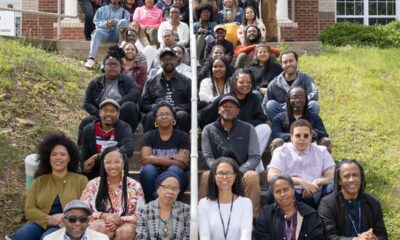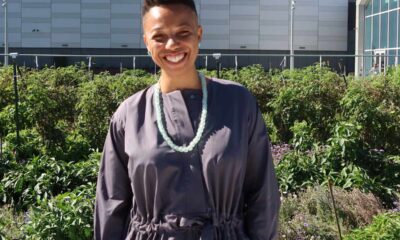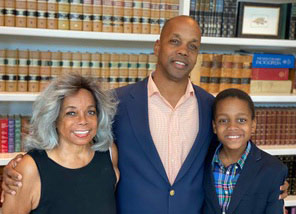Community News
Gov Hochul Urged to Approve NY State BIPOC Missing Women and Girls Task Force

By Fern Gillespie
New York City is facing a crisis of missing Black women and girls and it is rarely discussed. In 2023, the NYS Senate passed a bill to establish a task force on missing women and girls who are Black, indigenous, and people of color (BIPOC). It is awaiting the signature of Gov. Hochul. The task force is to develop policy changes that will work to address the lack of care and concern for missing and murdered BIPOC women and girls with New York state governmental agencies. The bill was introduced by Senator Lea Webb, chair of the Women’s Issues Committee in the NYS Senate, who is a former community activist, professor, and Binghamton City Councilmember.
“We have an epidemic of missing BIPOC Women and Girls in the US and in New York State the numbers keep rising. A staggering number of women and girls go missing or are murdered every year in the US. The statistics are disproportionately worse for the BIPOC community nationwide and here in New York,” Senator Webb told Our Time Press. “Of the more than 250,000 women and girls reported missing across the country in 2020, 40% were BIPOC, with Black women and girls making up 30% of those numbers, according to data from the National Crime Information Center (NCIC).”
Our Time Press spoke to Senator Webb and Brooklyn Assembly Member Phara Souffrant Forrest, a supporter of the bill. Both are Black women who are frontline advocates in making the public aware of this crisis and saving the lives of these missing BIPOC women.
OTP: Why do you think that missing Black girls are often dismissed as runaways and not being abducted?
LW: Missing BIPOC girls are often categorized as runaways which leaves cases to be pushed aside and treated with a lack of urgency. As a result, cases involving Black women and girls are not treated with the same sense of urgency, the community is less likely to be alerted by the media, and fewer resources are invested in their cases. Compounding the proportional disparity in the number of disappearances impacting the BIPOC community is the fact that their cases receive far less media attention and resources.
OTP: You introduced bills on human trafficking that were approved by Gov Hochul which required information in lactation rooms in Port Authority locations. Why?
LW: This legislation will ensure information regarding services for human trafficking victims is posted in heavily visited locations that may serve as gateways for traffickers passing through with their victims, including lactation rooms in New York’s commercial airports and truck stops. It is imperative that we work together to address the issues of human trafficking of vulnerable New Yorkers, ensuring that victims can safely access help and find resources without fear of retaliation.
Assembly Member Forrest, who represents Fort Greene and Clinton Hill and parts of Bedford-Stuyvesant and Crown Heights, is a nurse and union activist.
OTP: Why do you think it was important for you to support a bill creating a task force that focuses on missing and murdered BIPOC women and girls in NY state?
PF: Supporting a bill that creates a task force focusing on missing and murdered BIPOC women in New York State is important for several reasons. First, it acknowledges and validates the specific challenges faced by BIPOC women in terms of safety and justice. It recognizes that they are disproportionately affected by violence and often face systemic barriers when seeking help or justice. Second, such a task force can bring attention to the issue and raise public awareness, leading to increased understanding and empathy. This can help combat stereotypes, biases, and discrimination that may hinder investigations and support for victims. Third, the task force can collaborate with law enforcement agencies, community organizations, and advocacy groups to develop comprehensive strategies for prevention, investigation, and support services. By pooling resources and expertise, they can enhance coordination and ensure a more effective response to cases involving missing and murdered BIPOC women.
OTP: As a nurse, do you consider this violence against Black women a healthcare crisis?
PF: As a nurse, I believe it’s important to acknowledge that violence against Black women is a significant healthcare crisis that can have profound consequences. It is important to recognize that violence, in any form, can impact a person’s physical and mental well-being. Black women may face unique challenges due to intersecting forms of discrimination and bias, which can exacerbate the healthcare crisis they experience. Addressing violence against Black women requires a comprehensive approach involving healthcare providers, policymakers, and society as a whole to ensure their safety, well-being, and access to appropriate care.
OTP: Why do you think that missing Black girls are often dismissed as runaways and not being abducted?
PF: Historically, there has been a tendency to overlook the seriousness of missing persons cases involving Black girls, leading to delayed or inadequate responses from law enforcement agencies. This discrepancy can be attributed to various factors, including racial stereotypes, socioeconomic disparities, and unequal media representation. These systemic biases can perpetuate the perception that Black girls are inherently more likely to run away, rather than being victims of abduction or foul play. To address this issue, it is essential to promote awareness and education about the disproportionate impact of missing Black girls. To ensure that every missing person case is treated with the utmost seriousness and urgency, community engagement and collaboration are key. Empowering local organizations to raise awareness and support families of missing Black girls is crucial. By working together, we can ensure that every missing person receives the attention and resources they deserve.
On November 3 at 5:45 PM at NYC City Hall near the fountain, there will be a candlelight vigil for missing and murdered Black women and girls. Speakers include Jumaane Williams and Inez Dickens; in addition, family members of missing Black women and girls. The vigil is hosted by girl empowerment advocate Dawn Rowe, founder of Girl Vow. Contact info@girlvow.org.













